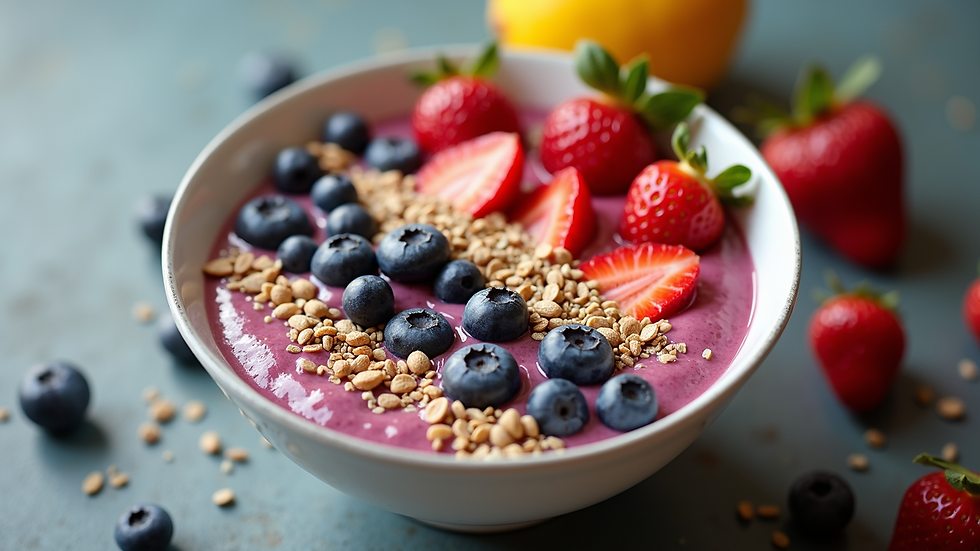Exploring the Growing Trend of Functional Nutrition in Consumer Food Choices
- Dan Masery

- Aug 12, 2025
- 3 min read
In recent years, functional nutrition has emerged as an influential trend in consumer food choices. As people become more mindful about their health, they seek foods that do more than just satisfy hunger; they want foods that provide concrete health benefits. This shift reflects a larger movement toward personalized nutrition, where individuals are not just eating to live but are looking to enhance their well-being through their dietary choices.
This blog post will explore the growing trend of functional nutrition, the reasons behind its rise, and how it is influencing consumer food choices.
Understanding Functional Nutrition
Functional nutrition emphasizes how food promotes health and prevents disease. Unlike traditional nutrition, which often focuses on calorie counting or macronutrient ratios, functional nutrition considers each person's unique needs. It recognizes that the right foods can be powerful tools for improving health.
For instance, berries contain antioxidants that may reduce the risk of chronic diseases. Studies show that diets high in antioxidants can lower inflammation, potentially reducing the risk of heart disease by 30%. Likewise, probiotic-rich yogurt encourages gut health; research indicates that consuming probiotics can improve digestion and might enhance the immune response by up to 50%. With increased awareness of such benefits, consumers crave food that positively impacts their health.
The Rise of Health-Conscious Consumers
The growth of health-conscious consumers significantly drives the functional nutrition trend. The internet and social media provide access to vast amounts of information, empowering individuals with knowledge about nutritional choices. People are actively searching for foods that align with their health objectives, whether that's weight management, improved digestion, or enhanced immunity.
The COVID-19 pandemic further accelerated this focus on health. According to a survey, about 70% of consumers became more cautious about their health amid the pandemic, leading to increased interest in functional foods that can bolster immune systems.

The Role of Food Labels and Marketing
With rising consumer interest in functional nutrition, food manufacturers try to meet this demand by promoting products that highlight their health benefits. Labels often tout specific nutrients, for example, "high in omega-3 fatty acids" or "rich in fiber." These marketing tactics cater to consumers seeking transparency about their food.
While reviewing labels, consumers must be cautious. Not every health claim holds true, and some products may advertise themselves as "functional" without proven benefits. Educating oneself about nutrition can empower consumers to make clearer choices. Research shows that informed consumers are 50% more likely to select healthier options during grocery shopping.
Popular Functional Foods
Several functional food categories have gained popularity among health enthusiasts. These include:
Superfoods: Foods such as quinoa, chia seeds, and spirulina are praised for their nutrient density. For example, quinoa has nearly twice the protein content of rice along with essential amino acids.
Fermented Foods: Kimchi, sauerkraut, and kefir pack probiotics that benefit gut health. A study found that regular consumption of fermented foods can decrease the risk of chronic diseases by about 25%.
Plant-Based Proteins: With an increase in plant-based diets, lentils, chickpeas, and pea protein have gained traction due to their benefits and sustainable nature. Statistics indicate that plant-based diets can lower environmental footprints by up to 50%.
Adaptogens: Herbs like ashwagandha and reishi mushrooms are thought to help the body handle stress. Research suggests that adaptogens may reduce cortisol levels, which can lessen stress by around 20%.
As people discover these foods, they often find ways to integrate them into meals, from smoothies to creative dishes.

The Future of Functional Nutrition
The future of functional nutrition looks bright. As more consumers prioritize their health, innovations in food technology may lead to the creation of new functional foods targeting specific health concerns. Personalized nutrition plans, potentially based on genetic testing or microbiome analysis, are likely to become more common. These advances could allow individuals to tailor their diets precisely to their health profiles.
Additionally, wearable devices and health apps simplify tracking dietary habits and health metrics. This data approach encourages individuals to make smarter choices about their nutrition and lifestyle.
Looking Ahead
The focus on functional nutrition is expanding, with consumers increasingly seeking foods that offer specific health benefits. This trend indicates a wider shift toward personalized nutrition and a growing recognition of how essential food choices are to health. As the market for functional foods evolves, consumers will find more options to support their health goals.
By grasping the principles of functional nutrition and choosing wisely, individuals can leverage the power of food to boost their well-being. As this trend continues to grow, it will be fascinating to see how it shapes the future landscape of food and nutrition.








Comments